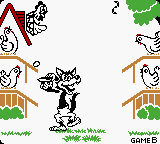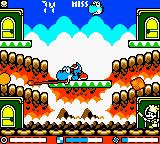Egg (Game & Watch): Difference between revisions
No edit summary |
mNo edit summary |
||
| Line 72: | Line 72: | ||
|Jap=''エッグ''<ref>[https://www.nintendo.co.jp/hardware/gamewatch/mario/history.html HISTORY|ゲーム&ウオッチ スーパーマリオブラザーズ|任天堂]. ''Nintendo Japan''. Retrieved June 23, 2021.</ref> | |Jap=''エッグ''<ref>[https://www.nintendo.co.jp/hardware/gamewatch/mario/history.html HISTORY|ゲーム&ウオッチ スーパーマリオブラザーズ|任天堂]. ''Nintendo Japan''. Retrieved June 23, 2021.</ref> | ||
|JapR=Eggu | |JapR=Eggu | ||
|JapM=Egg | |JapM=''Egg'' | ||
}} | }} | ||
Revision as of 20:37, June 23, 2021
Egg is a Game & Watch game that was released as part of the Wide Screen series on October 9, 1981. Nintendo acquired a Disney license and simultaneously released a version of this game as the first Mickey Mouse Game & Watch game. The Egg variation was not released in Japan until Game & Watch Gallery 3, which includes Classic and Modern gameplay.
The alarm indicator of this game is a bell that is located beside the hen, and the hen swings the bell when the alarm goes off.
Gameplay
Classic version
In the original version, a wolf must catch chicken eggs sliding down conveyor belts. Each egg gives the player one point, and if the player can get 200 and 500 points, all misses are erased. As the game progresses, the eggs will slide down faster. If an egg breaks while a chicken is out the window, a baby chicken will pop out of the broken egg, and the player will get half a miss. It is Game Over only if the player gets three misses, though, so the player will still be playing if they have 2.5 misses. In Game A, the eggs fall from three drops. In Game B, the eggs fall from four drops.
Modern version

In the Modern version, a Light Blue Yoshi needs to catch Yoshi Cookies that have just come out of the oven in his tongue. The closer to a conveyor belt's edge a cookie is, the more it is baked. The Yoshi earns a point for eating an unbaked cookie and two points for a baked cookie. Sometimes, a Bob-omb slides down a conveyor belt. The Yoshi must avoid eating this foe, or he faces getting a miss. If Mario pops out of any of the doors, the Yoshi will get half a miss if he misses a cookie. However, eating a Bob-omb while Mario is present would still count as a whole miss. Every perfectly baked cookie the Yoshi eats fills that cookie's meter. Eating a burnt cookie will decrease that cookie's meter. If one of the cookie meters is filled up, a Yoshi-shaped cookie will appear. If the Yoshi eats that cookie at the right time, he will create a Yoshi Egg, earning 10 points. The Yoshi can make up to two Yoshi Eggs, and if he continues to catch cookies without missing, one egg will eventually release a Baby Yoshi, rewarding the Yoshi with 10 points. The Baby Yoshi will temporarily eat cookies at a certain angle, earning five points for each cookie it eats. Getting a miss while an egg is present will cause the egg to disappear. At 200, 500, and 700 points, a heart will appear and slide down one of the conveyor belts, and if the Yoshi catches it, a miss will be removed. The Modern version also features music, with the tempo changing depending on the speed of the game.
Controls
: Move
and
: Diagonal
Super Smash Bros. Brawl sticker information
| Name | Image | Artwork from | Effect in The Subspace Emissary |
|---|---|---|---|
| Egg | 
|
Game & Watch | [Weapon] - Attack +4 |
Gallery
Modern version
Yoshi Cookie (squared)
Names in other languages
| Language | Name | Meaning | Notes |
|---|---|---|---|
| Japanese | エッグ[1] Eggu |
Egg |
Trivia
- In the Modern version of Egg, if a cookie falls to the ground while Mario is present, the Yoshi will still eat it, although he will become sick.
External links
Information about Egg in In The Attic, a website dedicated to classic videogames
References
- ^ HISTORY|ゲーム&ウオッチ スーパーマリオブラザーズ|任天堂. Nintendo Japan. Retrieved June 23, 2021.
| Game & Watch games | ||
|---|---|---|
| Super Mario franchise | Donkey Kong (1982, MS) • Mario Bros. (1983, MS) • Mario's Cement Factory (1983, TT/NWS) • Mario's Bombs Away (1983, PS) • Donkey Kong Hockey (1984, MVS) • Super Mario Bros. (1986, CrS | 1987, Sp | 1988, NWS) • Mario the Juggler (1991, NWS) • Game & Watch: Super Mario Bros. (2020, CoS) | |
| Donkey Kong franchise | Donkey Kong (1982, MS) • Donkey Kong Jr. (1982, NWS | 1983, TT & PS) • Donkey Kong II (1983, MS) • Donkey Kong 3 (1984, MVS) • Donkey Kong Circus (1984, PS) • Donkey Kong Hockey (1984, MVS) | |
| Miscellaneous | Green House (1982, MS) | |
| MS: Multi Screen • TT: Table Top • PS: Panorama Screen • NWS: New Wide Screen • MVS: Micro VS. System • CrS: Crystal Screen • Sp: Special • CoS: Color Screen | ||













